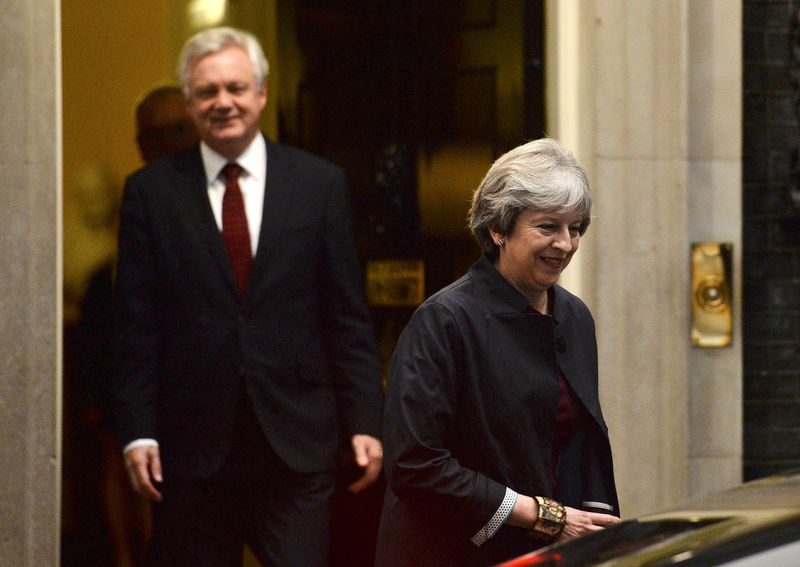 © Reuters. Britain’s Prime Minister Theresa May leaves to 10 Downing Street with the Secretary of State for departing the EU David Davis, in London
© Reuters. Britain’s Prime Minister Theresa May leaves to 10 Downing Street with the Secretary of State for departing the EU David Davis, in LondonLONDON (Reuters) – Britain’s government ignored opposition demands on Monday to share its economic assessment of Brexit this week, delaying the publication of reports Prime Minister Theresa May has said might hurt her negotiating stance.
May, weakened after losing her governing Conservative Party’s parliamentary majority, has been under pressure to release government analysis of the impact of Britain leaving the European Union, based on various scenarios including not reaching a deal with the bloc.
British lawmakers passed a motion in parliament last week to force the government’s hand in publishing what the opposition Labour Party called an analysis of the economic impact of Brexit on 58 economic sectors.
Labour later demanded that the analysis should be published this week before parliament breaks for recess on Wednesday and Brexit minister David Davis travels to Brussels to begin the sixth round of faltering talks with EU negotiators.
But in a letter on Monday to the head of a parliamentary committee, Davis disputed the description of the assessments, saying it was instead a “wide mix of qualitative and quantitative analysis contained in a range of documents developed at different times since the referendum”.
“Given the above, it will take my department – and other departments, since this work draws on inputs from across government – time to collate and bring together this information in a way that is accessible and informative,” he said in the letter.
“We will, of course, provide the information to the (parliamentary) committee as soon as is possible.”
He signaled that this would not be this week, instead offering a meeting with the chairman of the committee, Labour’s Hilary Benn, a meeting on Nov. 13 – when parliament returns from recess.
“I am concerned that the government is not treating that motion or the house with the respect or seriousness it requires,” Matthew Pennycook, a junior Labour Brexit spokesman, told parliament on Monday.
Before June’s election, May had resisted attempts to open up the government’s negotiating stance in negotiations to unravel Britain’s more than 40 years of union with the EU by saying that she did not want to compromise her position.
But weaker than ever and trying to manage a top cabinet team of ministers deeply divided over everything from Brexit to the government’s austerity agenda, May and her Conservatives must listen more to opposition voices in parliament for fear of not being able to force legislation through.
Fusion Media or anyone involved with Fusion Media will not accept any liability for loss or damage as a result of reliance on the information including data, quotes, charts and buy/sell signals contained within this website. Please be fully informed regarding the risks and costs associated with trading the financial markets, it is one of the riskiest investment forms possible.
Source: Investing.com




























